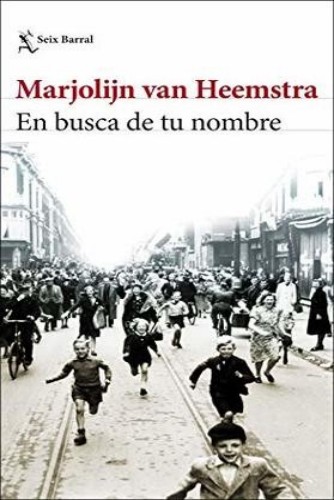
In Search of a Name
A Novel
کتاب های مرتبط
- اطلاعات
- نقد و بررسی
- دیدگاه کاربران
نقد و بررسی

September 7, 2020
Van Heemstra’s perceptive if tepid English-language debut confronts the transformation of family myth and the hazards of historical memory. When writer and narrator Marjolijn van Heemstra was 18, she was bequeathed a ring that once belonged to her late distant uncle Bommenneef, upheld by her family as a hero of the Dutch resistance during WWII. Fifteen years later, a pregnant Marjolijn, who had promised to name her first-born son after her uncle, sets out to better understand the man who was to be “the blueprint for my son.” As her quest for more information leads her to the national archives and reconnections with far-flung relatives, Marjolijn begins to realize Bommenneef might not have been as heroic as her family insists. In a plot punctuated by the travails of a complicated pregnancy, Marjolijn’s investigation touches critical questions about the past and its relation to the present. How do the stories one tells come to supplant the truth? Is it better to preserve an idealized family history than mess it up with facts? Unfortunately, the monotonous and observational narrative, mired in mundane particulars, fails to provide insight on these deeper mysteries. Readers expecting an immersive family drama will be disappointed.

October 1, 2020
This latest from award-winning Dutch author van Heemstra is unsettling autofiction investigating issues of war, vengeance, and morality in a profoundly personal way. The protagonist has always hero-worshipped her great-uncle Frans Julius Johan, celebrated in her family as a resistance fighter who killed a collaborator after World War II ended. She even plans to name her unborn son after Frans. But what she discovers while investigating his background blasts away the family myth; Frans was an unsavory character with no actual proof of his victim's guilt, and other, clearly innocent people died in the bombing. At issue is his being "convinced of the rightness of his deed, not ruffled by collateral fatalities, because a single life is meaningless in the light of the stars and one's own moral law," and what stands out here is van Heemstra's sharp and nuanced exploration of just how moral one's own law can be. VERDICT Striking portraiture of a fallen hero and the woman who finds him out; piecing together clues, van Heemstra keeps readers absorbed.
Copyright 2020 Library Journal, LLC Used with permission.

October 1, 2020
Perhaps there is no more consequential decision new parents make than the choice of their offspring's name. In the case of Dutch writer and narrator Marjolijn, she and her husband are further burdened by an unusual stipulation. When Marjolijn's grandmother gives her a signet ring once belonging to her deceased great-uncle Frans, she does so with the caveat that Marjolijn must name her son after him. The name itself is fine. It's the man himself who proves problematic. Rumored to have been a hero of the Dutch resistance for killing a Nazi sympathizer, Frans may have, in fact, been a villain. With those who knew him either dying or dead, Marjolijn has few leads to pursue, but as the weeks until her due date speed by, she embarks on a fevered mission to discover the man behind the myth. In this fictionalized account of her own family's history, van Heemstra offers a taut cat-and-mouse mystery made deceptively poignant by a mother's desire to offer her unborn child the best possible start in life.(Reprinted with permission of Booklist, copyright 2020, American Library Association.)

November 15, 2020
A Dutch mother-to-be strives to vindicate her future child's namesake. Each chapter begins with a week-by-week countdown to the first-person narrator's due date, which is also her deadline for finding out the truth about her "distant uncle" Frans. That narrator is Marjolijn van Heemstra herself, and this novel, van Heemstra's second, is drawn directly from life. When she was 18, Marjolijn's grandmother gave her Frans' ring since he died without any descendants. In return, Marjolijn has agreed to name her firstborn son after Frans, a hero of the Dutch resistance. Years later (exactly how many is not clear), her pregnancy forces the issue; she is hormone- and conscience-driven to learn whether Frans' name is worthy of being passed on. After the war, on Dec. 5, 1946, her uncle masterminded a bomb attack on a man named Boer, an alleged Nazi collaborator who was never punished. Frans was prosecuted and imprisoned for what, in peacetime, was a crime. Though preeclampsia threatens, Marjolijn takes furtive trips from her Amsterdam home to the National Archive in the Hague while her partner, D, is at work. The facts defy Marjolijn's every effort to verify Frans' heroism. Boer's collaboration was considered de minimis--he rounded up pigeons for the Wehrmacht. The bomb, delivered in a wrapped package to Boer's home on St. Nicholas Eve, also killed innocent bystanders, but, of this "collateral damage," Frans remarked, "These things happen." The supreme irony: Frans later founded a right-wing group with ties to ex-Nazis. The book is brutally honest about pregnancy, abortion, and living with ambiguity. Wry observations abound, well served by Reeder's translation; for instance, on the archive's proximity to a children's book museum, van Heemstra says, "one wrong turn and you're in the realm of fairy tales." In view of the novel's firm grounding in fact, one wonders why van Heemstra didn't simply write a memoir. Perhaps because fiction accommodates any number of wrong turns. The novel ends with an existential shrug, but perhaps that's the point. Sometimes rabbit holes contain only rabbits.
COPYRIGHT(2020) Kirkus Reviews, ALL RIGHTS RESERVED.

























دیدگاه کاربران